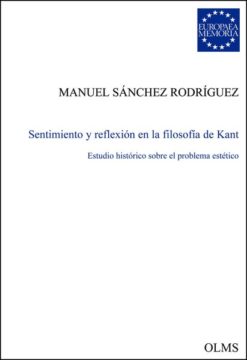Die „Kritik der Urteilskraft“ legt zum ersten Mal die philosophische Bedeutung des Geschmacks im Rahmen des Kritizismus dar. Es handelt sich um eine kritische Lösung für ein Problem, das Kant über zwei Jahrzehnten beschäftigt und ihn in Verlegenheit gebracht hatte. In der Schwierigkeit, die menschliche Fähigkeit zur ästhetischen Beurteilung des Schönen und das subjektive Gefühl der Reflexion philosophisch zu erklären, verbarg sich ein umfangreicheres Problem. Denn das ästhetische Problem stellte exemplarisch die Schwierigkeit dar, die Rationalität des sinnlichen Individuums auf der Grundlage der modernen Metaphysik und Erkenntnistheorie zu begründen.
Die vorliegende Untersuchung rekonstruiert die Entwicklung des ästhetischen Projekts Kants von 1770 bis1790 vor dem Hintergrund dieser Problematik, mit dem Ziel, die Rolle der Kritik des ästhetischen Geschmacksurteils im System der Vernunft zu erörtern und die historische Bedeutung dieser Theorie im Kontext der Leibniz-Wolffschen Schulphilosophie zu beleuchten.
***
La „Kritik der Urteilskraft“ ofrece por primera vez una comprensión del significado filosófico del gusto en el marco general del criticismo. Se trata de una solución crítica para un problema que había provocado la perplejidad de Kant durante dos décadas. En la dificultad para explicar filosóficamente la capacidad humana de apreciación estética de la belleza y el sentimiento subjetivo de reflexión se escondía un problema de mayor calado, pues el problema estético expresa de forma ejemplar la dificultad para plantear una comprensión de la racionalidad del individuo sensible desde los fundamentos de la metafísica y la teoría del conocimiento de la modernidad. La presente investigación reconstruye el desarrollo del proyecto estético de Kant desde 1770 hasta 1790 a la luz de esta problemática, con el objetivo de aclarar el papel de la crítica de los juicios de gusto en el sistema de la razón y el sentido histórico de esta teoría en relación con la filosofía de la escuela leibniciano-wolffiana.
***************
In Kant’s Kritik der Urteilskraft, the philosophical significance of taste is defined for the first time in the context of criticism. This is a critical solution to a problem which Kant had been working on for over two decades and which had placed him in a dilemma. The difficulty of explaining the human capacity for an aesthetic judgement of beauty and the subjective feeling of reflection was only part of a wider problem. This was because the aesthetic problem exemplified the difficulty of justifying the rationality of a feeling individual on the basis of modern metaphysics and epistemology.
This study reconstructs the development of Kant’s aesthetic project between 1770 and 1790 against the background of this problem; its aim is to reconsider the role of the critique of aesthetic taste and judgement in the system of reason and to explain this theory in the context of Leibniz’s and Wolff’s Schulphilosophie.
- Veröffentlicht am Mittwoch 20. November 2024 von Olms, Georg
- ISBN: 9783487143385
- 319 Seiten
- Genre: Aufklärung, Hardcover, Philosophie, Renaissance, Softcover
